EARTHseed Farm is in contrast to its counterparts amongst Sonoma County’s rolling vineyards and redwood forests.
A hand-painted signal on the entrance greets guests with the phrases, “Welcome Black to the land.”
On the driveway to the two-story farmhouse that lies on the coronary heart of the 14-acre property, one other signal pays homage to the Black scientist George Washington Carver and the escaped slave who rescued scores from Southern plantations on the Underground Railroad, Harriet Tubman.
Just a few steps away, a likeness of the late Black sci-fi writer and Pasadena native Octavia Butler gazes from a mural painted on an outbuilding.
The Afrocentricity that radiates throughout EARTHseed is supposed to make Black guests particularly really feel welcome — not a straightforward activity in a county that’s simply 2.3% Black and the place the common house worth — $1.1 million — is out of vary for many Californians of any race.
Aggressive and impactful reporting on local weather change, the surroundings, well being and science.
For the farm’s founder, Pandora Thomas, there’s an excellent better goal. Thomas, a Berkeley-based naturalist and environmental educator, desires to show her fellow Black Californians to make use of their African American heritage to usher their communities — and all of humanity — by way of the local weather disaster.
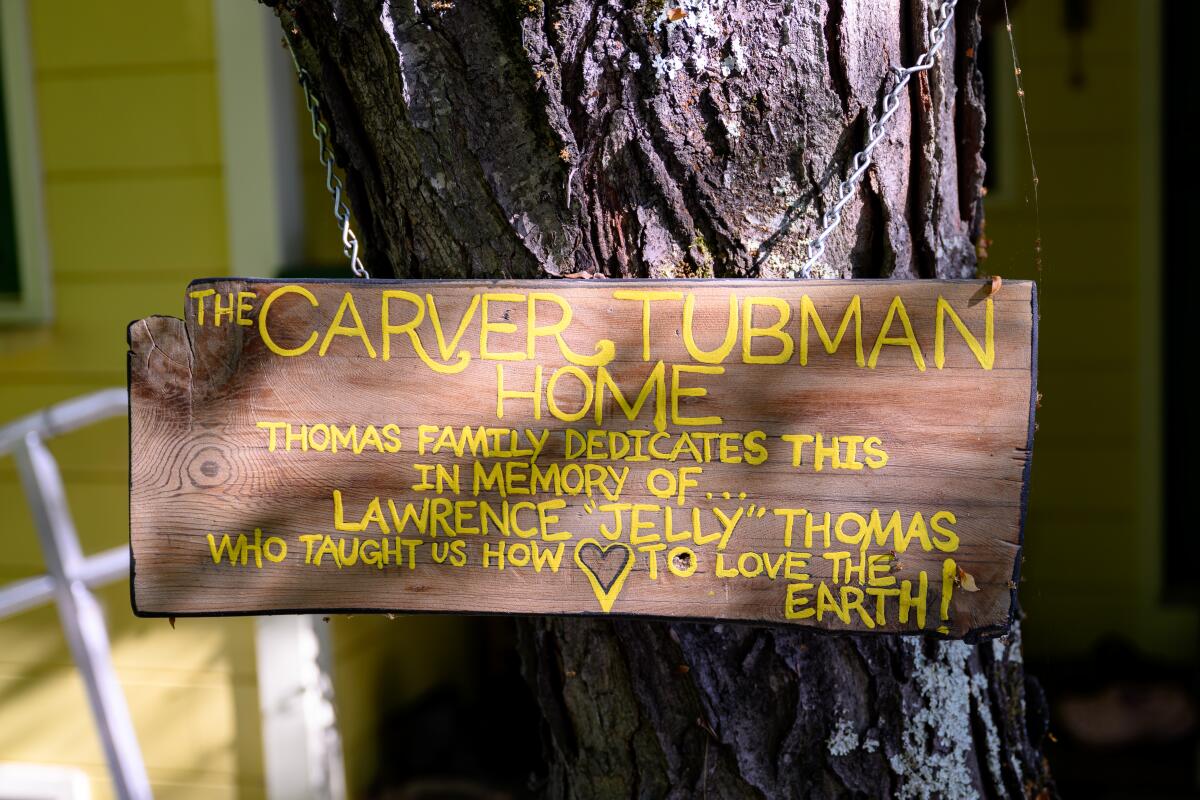
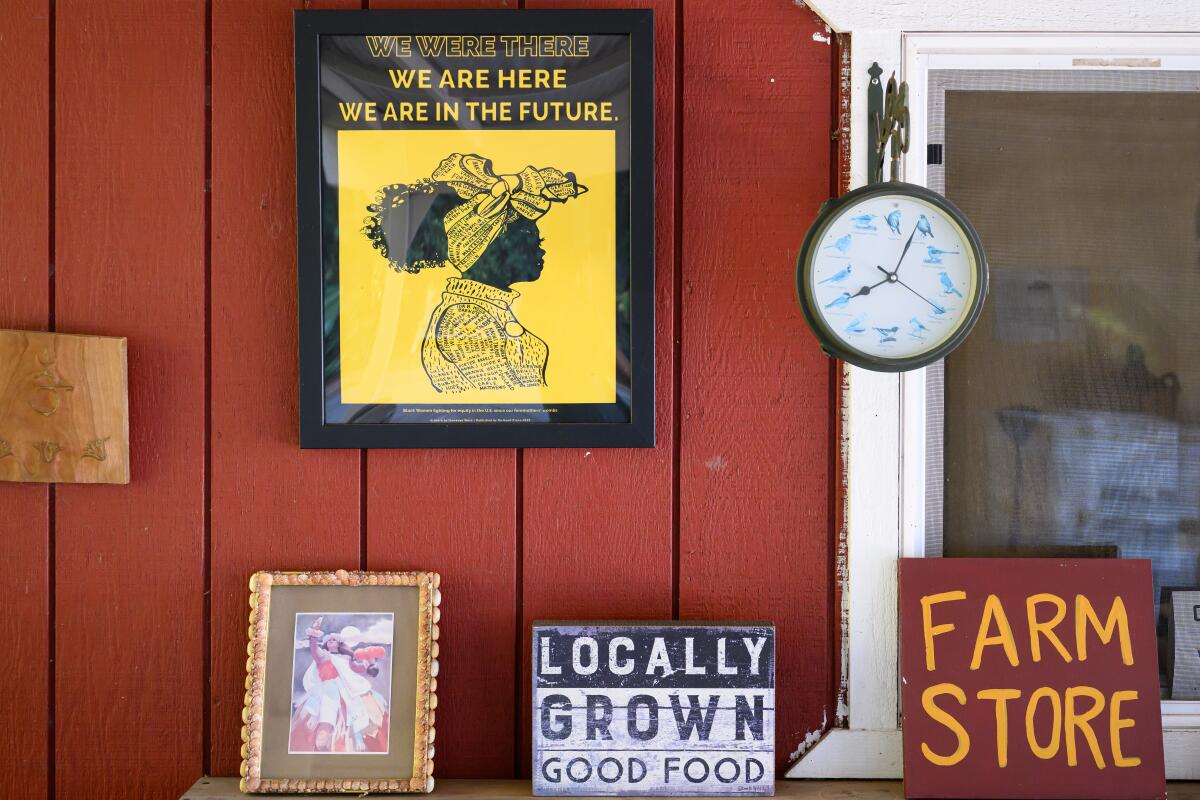
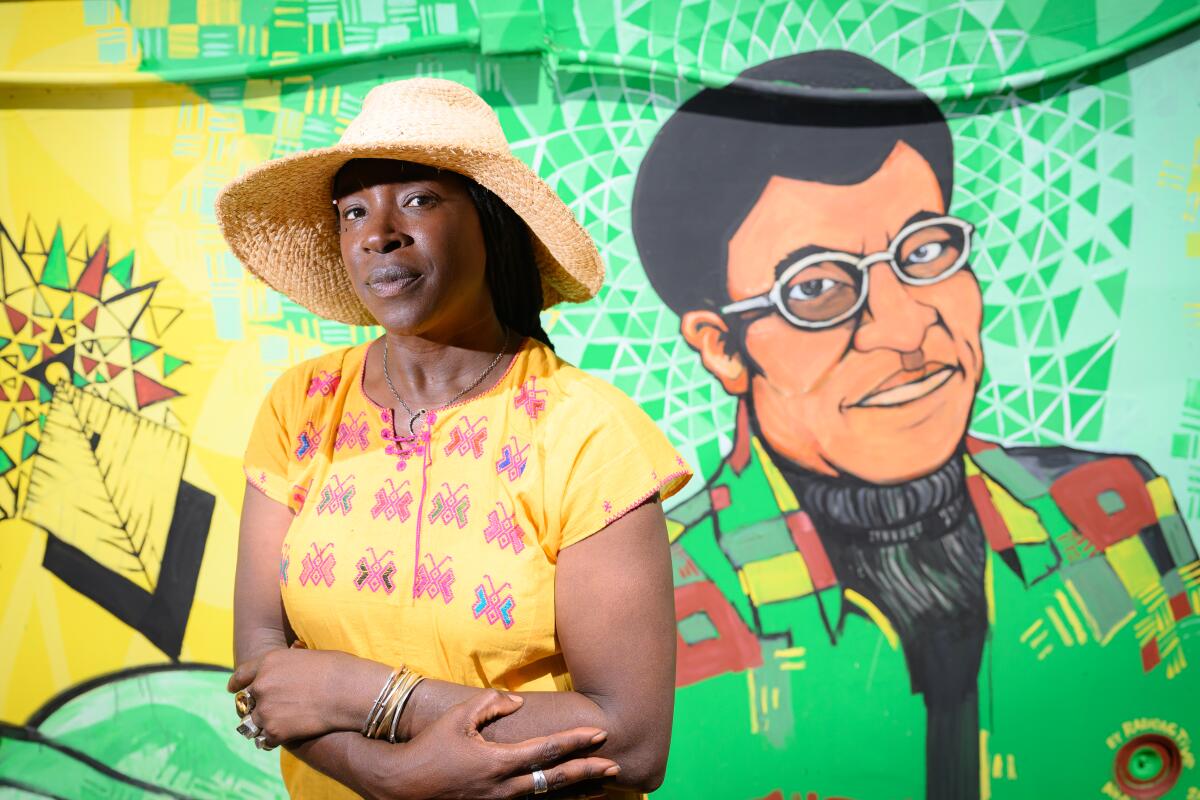
High: An indication honors George Washington Carver and Harriet Tubman at EARTHseed Farm, the place individuals should buy freshly grown produce and take excursions. Above: Founder Pandora Thomas stands close to a mural depicting writer Octavia Butler, whose 1993 novel, “Parable of the Sower,” had an enormous affect on her. (Josh Edelson / For The Instances)
What comes throughout as a hip U-pick fruit farm — one that’s open to all — can be a laboratory for permaculture. It’s an strategy to moral land administration and farming that’s broadly embraced in California and that Thomas distills into three age-old ideas: Be an excellent steward of the Earth. Take solely the assets that you simply want. Pay it ahead by sharing what you reap.
These values are urgently wanted now, says Thomas, who typically offers excursions and workshops on the farm.
Black and brown Californians don’t simply face an existential menace from ills corresponding to racist violence, she says. Due to discriminatory housing practices which have crowded them into susceptible ecosystems, generational poverty and an absence of entry to land the place they will develop their very own meals, their communities are additionally at better threat from climate-related risks: Extended droughts, deadlier wildfires, flood-inducing rains, air air pollution and the specter of water and meals shortage.
“Folks look to Black tradition for what’s the latest music, hair type or style pattern,” says Thomas, 51. “Think about in the event that they regarded to our communities for what’s the latest pattern for the way we needs to be dwelling round local weather practices and environmental practices.
“What can we garner from the previous that we will carry to this second to assist us plot a greater future?”
::
The temperature approaches 100 levels sooner or later as Thomas, wearing jean shorts, a yellow T-shirt embroidered with butterflies and a wide-brimmed straw hat, invitations guests from the Booker T. Washington Neighborhood Service Heart in San Francisco to chill off within the shade of an infinite willow tree.
“The cities which might be having all of those warmth waves, think about if that they had lovely canopies like this, lined with pure timber to chill the air, absorbing water,” Thomas says, taking over the energetic tone of a motivation speaker. “Can all of us simply go to a leaf and thank Mama Willow?”
The group, a mixture of teenagers and seniors, virtually all of them Black, erupts in thank yous because the willow’s branches sway round them within the dappled mild.
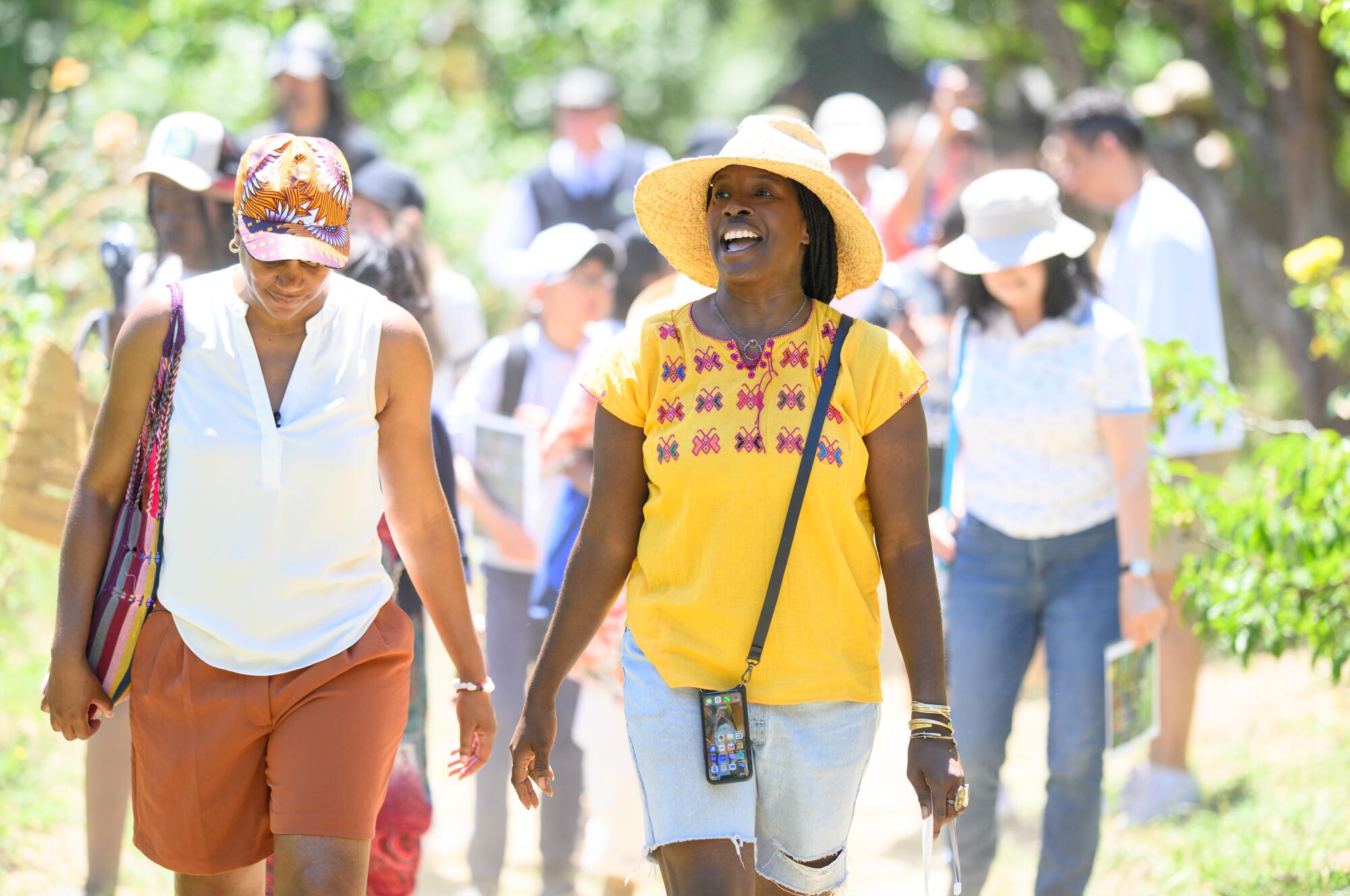
Founder Pandora Thomas, proper, leads a U-pick tour group at EARTHseed Farm.
(Josh Edelson / For The Instances)
Thomas strikes on to a patch of mulch subsequent to a rainwater storage tank.
“African communities are a number of the oldest communities which have captured water because it falls and never simply let it go wherever it goes,” she tells the group, pointing to the absorbent floor cowl and the tank.
“Many cities which might be flooding are flooding as a result of they’re stuffed with laborious surfaces that may’t seize, maintain the water and direct it someplace extra useful.”
Subsequent cease — a hexagonal bathhouse that’s harking back to a conventional mud dwelling in Africa.
“Folks of African ancestry have been additionally the primary individuals on this planet to construct constructions with the earth — partly as a result of we have been the primary individuals but in addition as a result of the place we lived was so scorching,” Thomas says.
She urges her company to the touch the constructing and really feel how cool its surfaces stay regardless of the blazing temperature.
“With all of those wildfires and this warmth, we needs to be constructing with extra earth — extra resilient supplies,” she says.
One of many seniors within the group can’t assist however share her burst of African satisfaction.
“We have been the first engineers,” she exclaims.
Thomas established EARTHseed as a nonprofit instructional farm in 2021 partly to assist fill a void. Though there are a variety of established, Black-led permaculture applications within the Golden State, many Black Californians usually are not taught about their ancestral connection to sustainable land administration and civic design, she says.
All throughout the U.S. within the late 1800s and early 1900s Black homesteaders had arrange communities and farms in an try and chart their very own destinies — together with in California — just for a few of these settlements to be overrun, seized or burned down in racially motivated assaults.
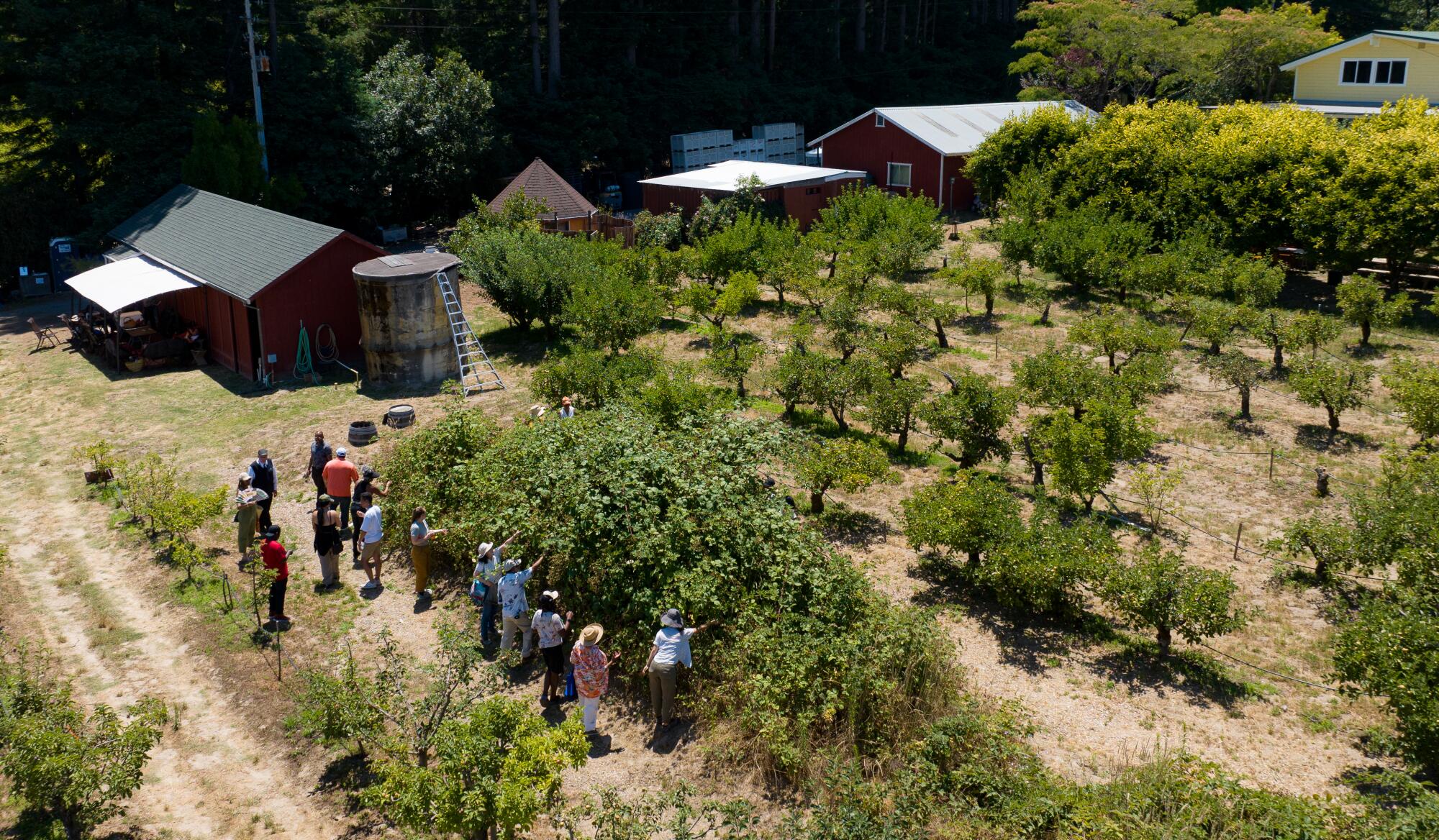
A U-pick group from San Francisco picks berries at EARTHseed Farm in Sonoma County.
(Josh Edelson / For The Instances)
EARTHseed’s setting — on the ancestral homeland of the Coastal Miwok and Southern Pomo tribes — is a sacred area for Black individuals to study methods for resilience. Indigenous Californians have for hundreds of years resisted makes an attempt to erase their tradition and erode their connection to the land by holding true to historic farming practices.
The spirit of Butler, who’s been an inspiration to Afrofuturists and environmentalists alike, may be felt right here too.
Her eerily prescient imaginative and prescient of Twenty first-century Los Angeles as a climate-disaster cautionary story lies on the coronary heart of her massively influential 1993 novel, “Parable of the Sower.” Pure assets like clear water have been depleted, social upheaval and mob violence have pushed residents with means into fortified compounds and abject poverty leads some to take excessive measures simply to safe the fundamental requirements of life.
The protagonist, a younger Black Angeleno whose group has been destroyed within the chaos, invents her personal faith referred to as Earthseed, whose “god” is change itself. She leads a gaggle of fellow survivors to far Northern California, within the hope of beginning over off the grid.
The novel is unflinching in its portrayal of the stark selections that Californians should make in a fractured society — and on a deteriorating planet. Thomas discovered the guide terrifying when she first learn it in 1999 whereas learning at Union Theological Seminary in New York. But, she mentioned, there was additionally “a hope and glimmer in it — and nuance.”
She was overcome with the need to sometime be part of a group just like the one within the novel.
The guide additionally acquired her occupied with the teachings she realized in childhood about permaculture.
“My dad and mom form of espoused that as a result of that’s additionally Black individuals ethics,” Thomas says. “We all the time helped all people. My mother took care of the Earth, so we have been form of like Earth individuals. Her household have been sharecroppers… So I really feel like EARTHseed was simply the fruits of that journey I used to be on once I learn the guide.”
::
Stepping by way of EARTHseed’s gates seems like a therapeutic homecoming for a number of the group middle guests.
A number of say that as Black individuals, they haven’t skilled such a detailed bond with the land since they have been youngsters visiting their grandparents’ farms within the Deep South.
“I didn’t even know that inside an hour of my house in San Francisco, an city surroundings that’s lower than 6% Black, that I may actually come right here to a Black-owned farm, that’s Black-centric, the place I see Black function fashions,” says Phyllis Bowie, 63.
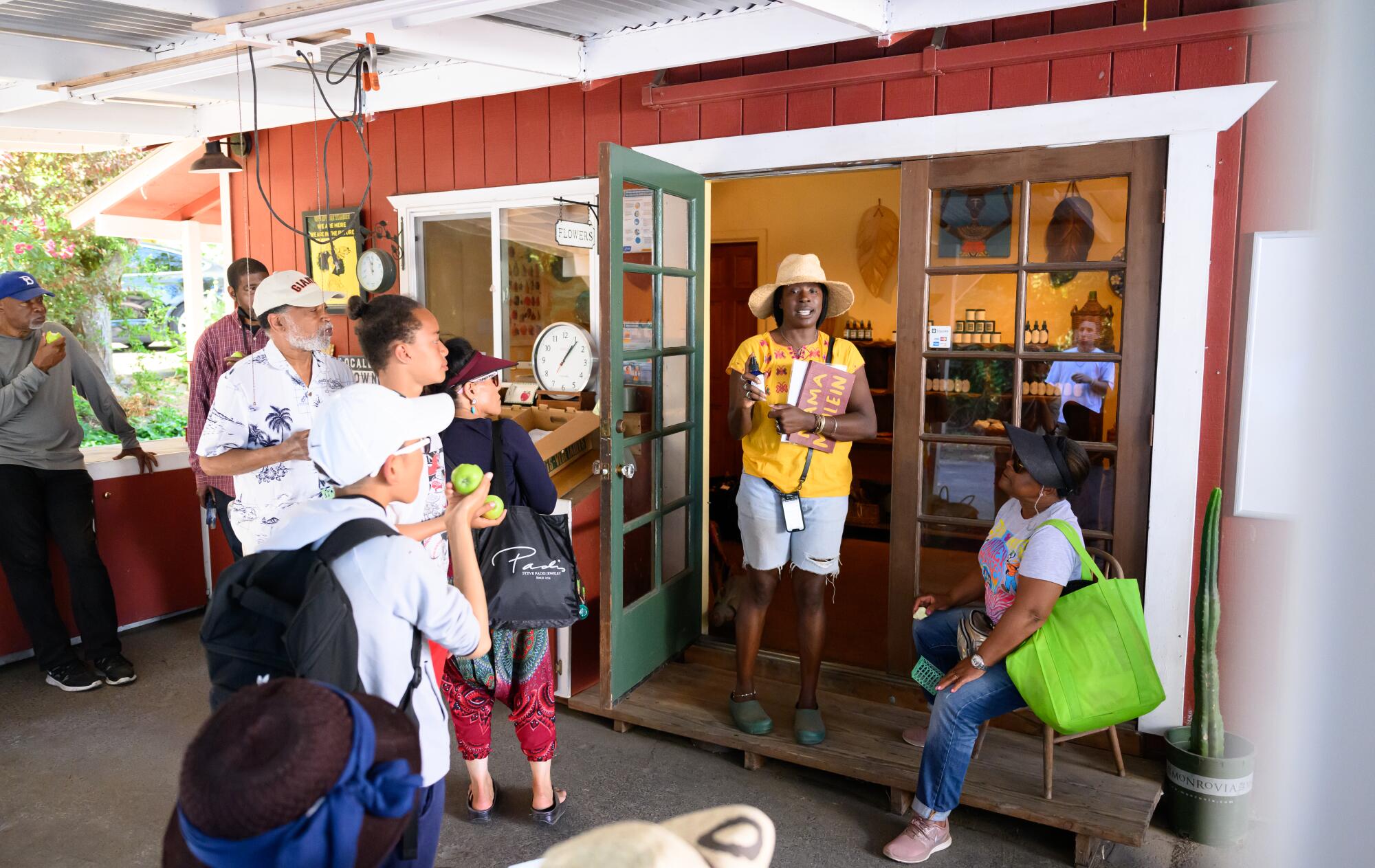
Pandora Thomas, standing within the doorway of a present store, speaks to a gaggle of U-pick guests after giving them tour of the farm.
(Josh Edelson / For The Instances)
Bowie grins as she maneuvers her hand into thorny blackberry bushes, the place the darkish fruits are ripe and scorching to the contact. She plucks one and closes her eyes whereas biting into it.
“That is what I like — simply me right here, pulling off a berry and consuming it, lowers my stress, lowers all the racial biases that I reside with,” says Bowie, who hosts a YouTube present in San Francisco about Black meals sovereignty. “All of it melts away.”
Bowie locations her hand on her chest and tries to not cry.
She finds it profound that Black Californians, who battle so laborious simply to be revered for who they’re, may also play a task within the dialogue in regards to the state’s local weather future.
Bowie had as soon as entertained the concept of shopping for farmland in rural Northern California however discovered the individuals too racist. Due to the instance that Black farmers like Thomas have set, Bowie says she plans to revive her search.
Shakirah Simley, the group middle’s govt director, sees glimmers of the Black self-sufficiency that the Tuskegee College founder and presidential adviser Booker T. Washington envisioned greater than a century in the past and that Butler depicted in her writing.
The group middle works with Black farmers corresponding to Thomas to supply contemporary, natural produce for its food-giveaway applications. Simley, 38, makes use of discipline journeys to locations corresponding to EARTHseed to go a step additional — to indicate what Booker’s and Butler’s visions can appear like within the current.
“It helps us ensure that we all know that we will outline our personal future and make our personal approach and protect our personal company,” she says.
Whereas Thomas introduces the group to the resident pigs who act as a sustainable food-waste disposal system, farm supervisor Brent Walker walks down rows of crops to examine ripening apples and Asian pears and examine for leaks in irrigation hoses.
He says EARTHseed is fortunate as a result of the land’s earlier homeowners had already integrated sustainable practices to develop crops, as evidenced by the deep swells, or trenches, they dug between rows of Asian pear and apple timber to seize and maintain rainwater throughout the moist season.
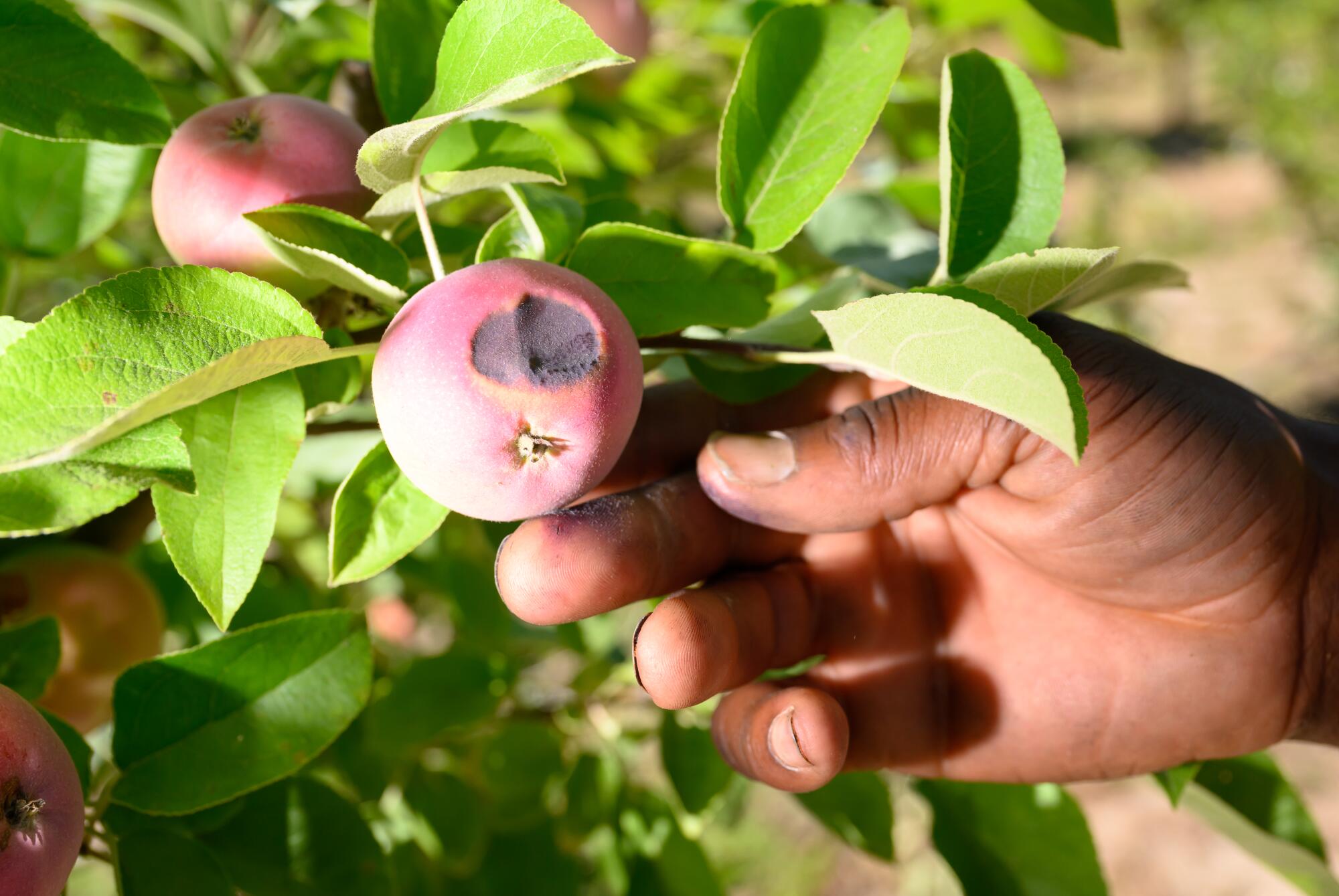
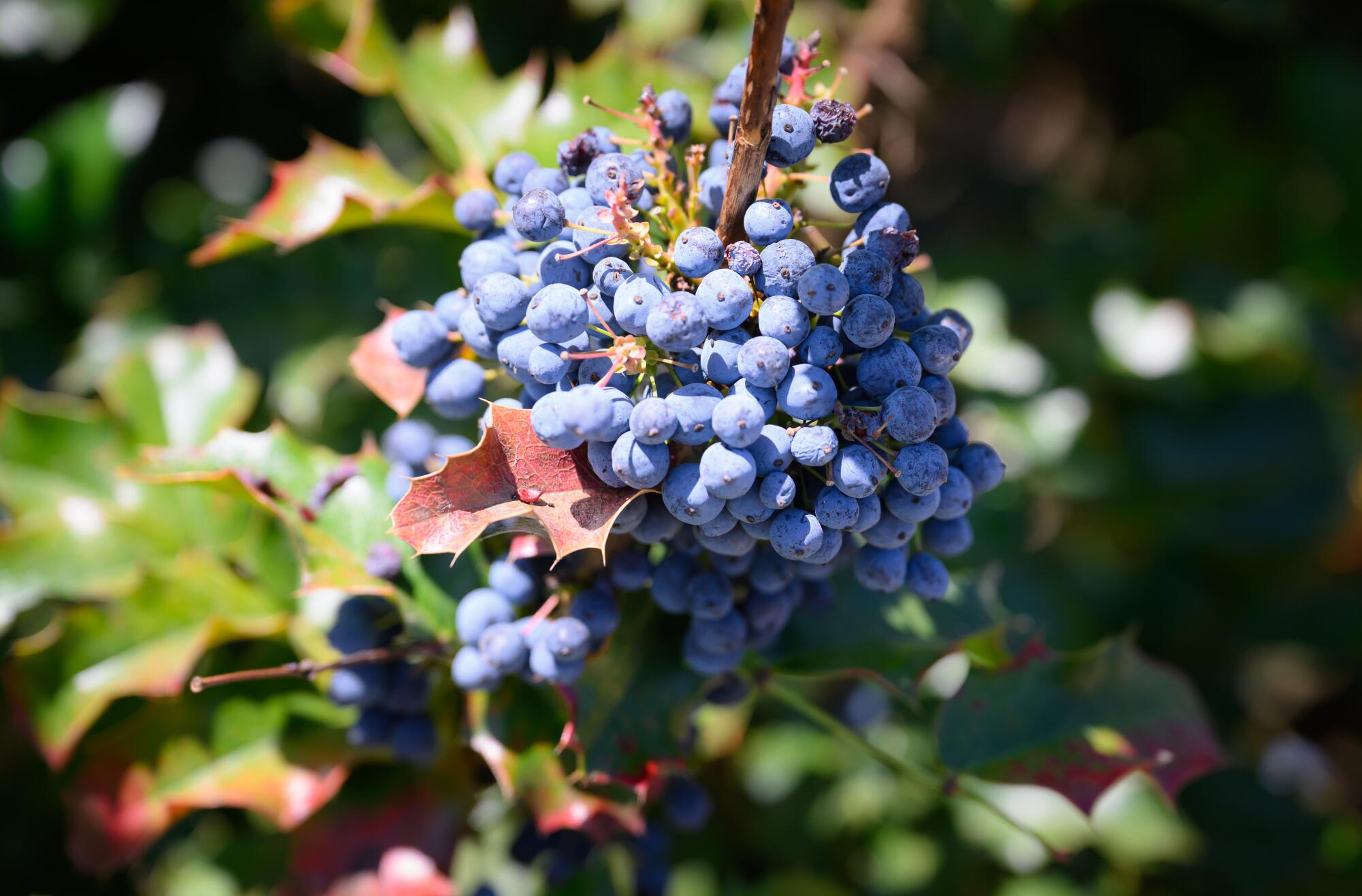

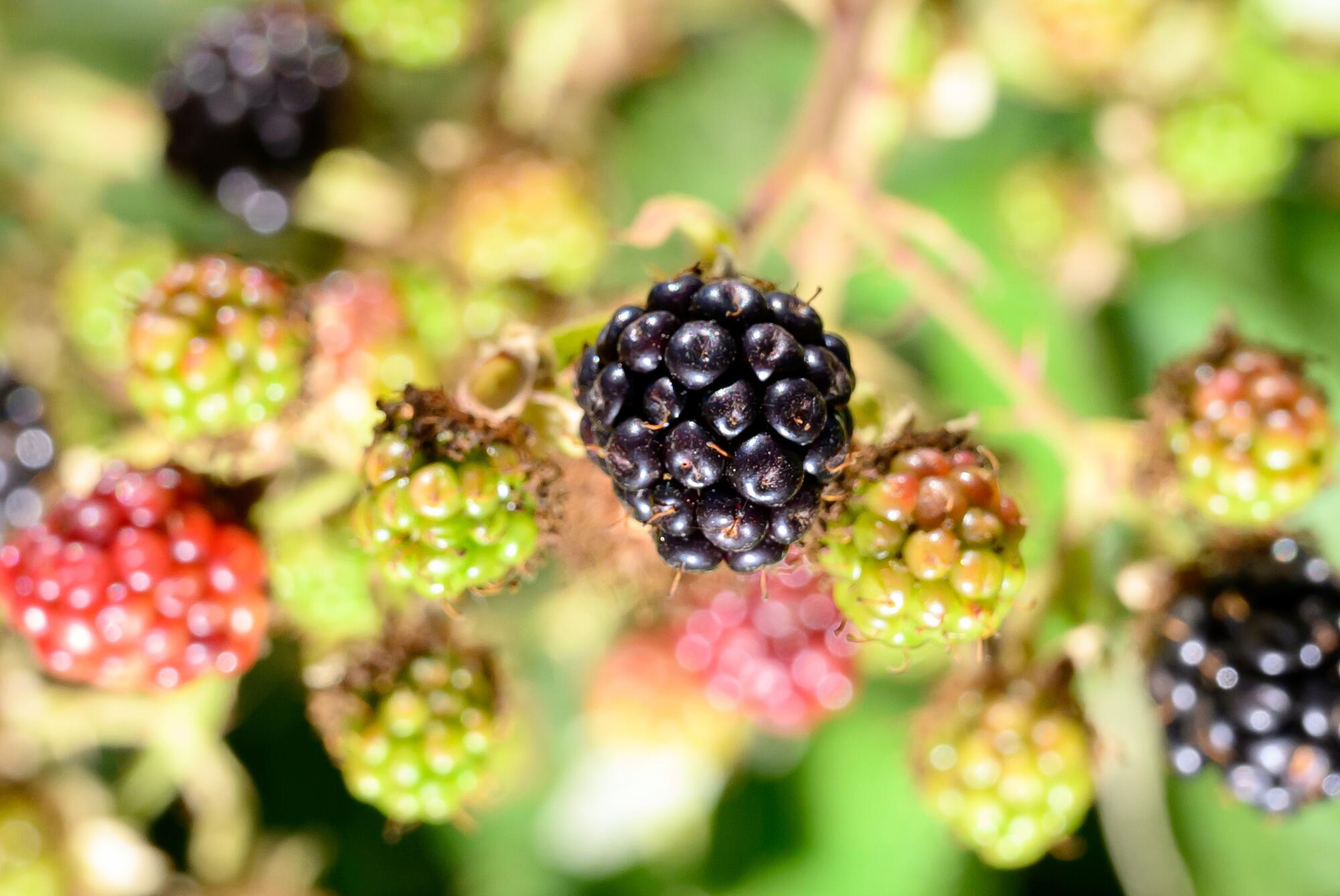
From prime, farm supervisor Brent Walker factors out an apple burned by the solar. Blackberries and freshly picked raspberries. Blackberries develop on a bush.
(Josh Edelson / For The Instances)
The farm remains to be prone to local weather change, he says.
Walker, 44, takes an apple in his hand and factors to a dark-brown blister the dimensions of a silver greenback on its reddish pores and skin.
“Solar burn,” he says. The extreme warmth is harmful for his fruit timber.
He spots one other burned apple, then one other.
Broken fruit is much less interesting to the native companies, farmer’s markets and guests that purchase EARTHseed’s produce.
Making the farm much less prone to the harms of local weather change remains to be a piece in progress, Walker says as he dabs sweat from his forehead, the solar beating down on his naked chest. However he feels buoyed by the farm’s bigger mission.
All too typically, each he and Thomas say, Black People are portrayed as mere victims of inequity and injustice, though traditionally they’ve proven a capability for transcending their circumstances.
“Having that spirit of self-reliance and eager to make one thing out of nothing, it’s in all of us,” Walker says.
He says it’s unattainable to stroll across the farm with out feeling as if Butler’s likeness is watching over him, Thomas and the small workers of staff.
“Some days,” Walker says, “I see her and he or she offers me a smile. Some days … Her eyes say, ‘Do higher tomorrow.’ You’ll be able to’t go wherever with out taking a look at Octavia earlier than you permit.”
::
Thomas is reluctant to make herself the middle of EARTHseed’s story, however she says one other presence looms giant over the farm — that of her late father, Lawrence “Jelly” Thomas. His identify graces the identical plaque that honors Carver and Tubman.
She grew up in rural Mercer County, Pa., and it was her father, a metal mill employee whose individuals hailed from rural Arkansas, who first instilled in her a respect for the way people have an effect on the ecosystem.
He took Pandora and her sisters fishing and taught them the names of the minnows and worms he used to bait their hooks.
“He would simply harvest wild issues, which I assume he realized from his household, after we can be out,” she recollects.
The elder Thomas was in any other case stoic. However his shut bond with nature was as clear then as Pandora’s ardour for the surroundings is to these she guides across the farm.
Now Thomas, like her dad and mom and people who got here earlier than, is the one paying it ahead.
Thomas’ intentions aren’t misplaced on Felton Peterson, a member of Simley’s group. The 75-year-old is barely seen by way of the low branches of a mulberry tree as he searches for fruit.
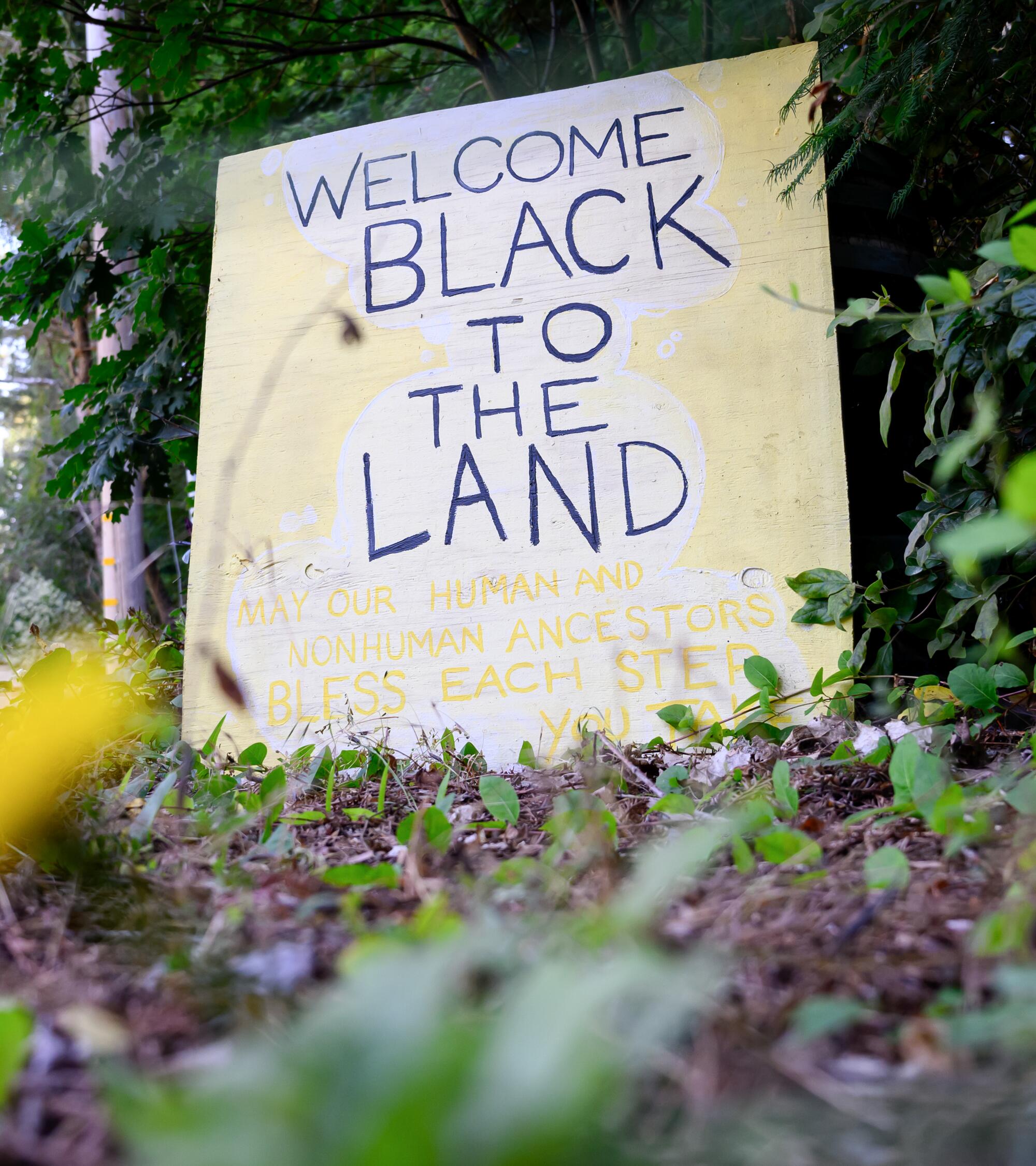
EARTHseed Farm greets guests with an indication that makes its Afrocentric strategy to permaculture clear.
(Josh Edelson / For The Instances)
“My grandparents had a farm,” he says. “Though I wasn’t one to work on a farm, what it means to have a farm and what they needed to undergo to feed themselves and/or others, you may’t put a worth on it.”
As a lot as EARTHseed is about serving to Black Californians put together for an unsure future, Peterson says, “this place will carry you again to your heritage.”
#Black #farmer #leans #heritage #Octavia #Butler #battle #local weather #change